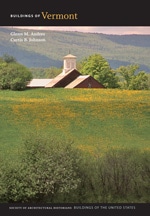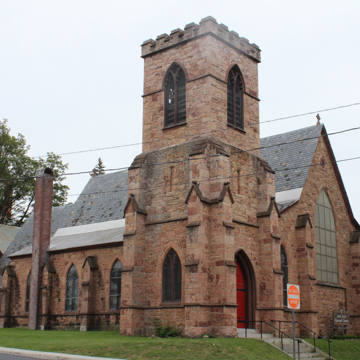St. Luke's is one of two Vermont churches—the other is St. Michael Episcopal Church (1858) in Brattleboro—by New York Gothic Revivalist Hart, who wrote and illustrated Designs for Parish Churches in Three Styles of English Architecture (1857). It is also the oldest building on Church Street. Clearly a descendant of the English parish churches that Hart so admired, St. Luke's is composed of a tall nave indicated on the facade by a grand pointed stained glass window, flanked by lower lancet-lighted aisles, and terminated to the east with a lower chancel. An entrance in the square bell tower gives access to the interior, as does a small gabled porch on the south side. The complex profile of the building is embellished with stepped buttresses that articulate each component of the massing. Walls are of warm, mottled local calico stone, rock faced and randomly coursed, and a brownstone belt course and buttress caps add touches of Ruskinian polychromy. Its activated form and sophisticated design help this small-scale building hold its own among the line of monumental buildings overlooking Taylor Park on Church Street.
You are here
St. Luke's Episcopal Church
If SAH Archipedia has been useful to you, please consider supporting it.
SAH Archipedia tells the story of the United States through its buildings, landscapes, and cities. This freely available resource empowers the public with authoritative knowledge that deepens their understanding and appreciation of the built environment. But the Society of Architectural Historians, which created SAH Archipedia with University of Virginia Press, needs your support to maintain the high-caliber research, writing, photography, cartography, editing, design, and programming that make SAH Archipedia a trusted online resource available to all who value the history of place, heritage tourism, and learning.















